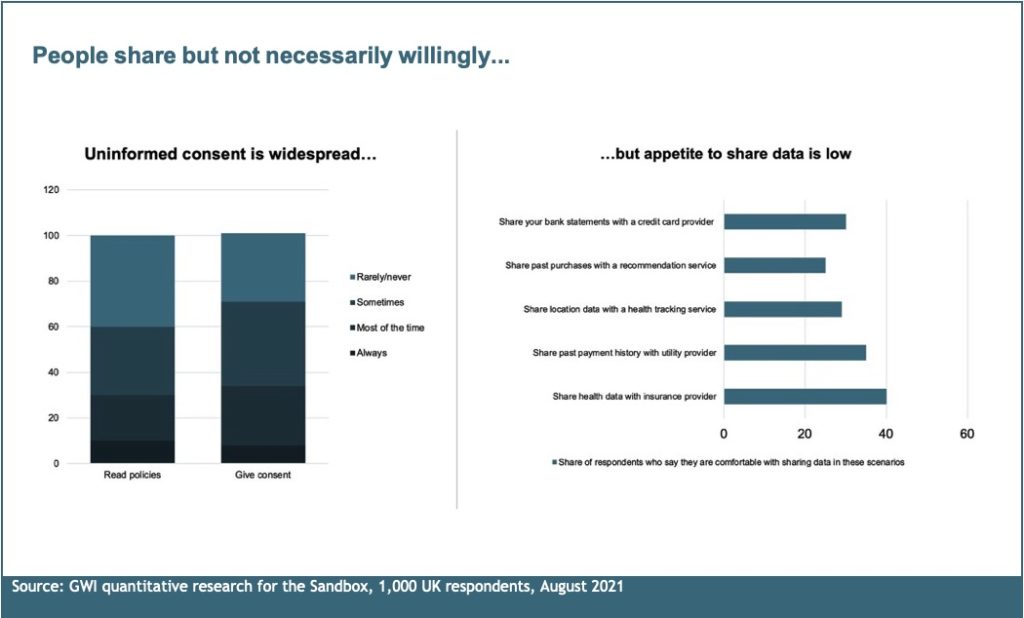By Rimma Perelmuter, Executive Director, Datum Future
It is time for companies to think very differently about the experience that people have when they are sharing data along the customer journey. They need to think about how that experience can help people to directly benefit, in order to build trust in their brand.
Why? Because trust unlocks value – for the individual, but also for business and society. To explain why, we need to understand how people feel about sharing data right now.
According to Zeitgeist research carried out by GWI, just one in five consumers see the benefit of sharing their own information. And yet, when there are clear personal benefits and certain conditions are met, 90% of digital users would be open to sharing data with companies to address their needs.
Ask people why they don’t want to share data and, generally, it’s due to a lack of confidence about how it will be used, protected and shared. Customers worry about fraud and losing control. They lack confidence about how their data is being used and protected. They also lack understanding about the benefits they could gain and the value they should be receiving.
Datum Future took a deep dive to gain insights into UK parents aged 18 – 35 living in poverty on Universal Credit, with all self-reporting that they are struggling to make ends meet.
People’s concerns are emotional
The research revealed how emotional the concerns are that people have about sharing their data: security worries; fear of fraud; worry about hassle; a feeling on invasiveness. And that emotional strain is more pronounced for people living in poverty: they often feel judged and worry that data they share can reveal details that would lead others to judge them or businesses to reject them.
And yet, people also feel resigned to sharing their data. Our interviewees revealed how they tend to click to accept terms, conditions and privacy notices because they felt they don’t have much choice, and reading takes too much time out of their busy days.
That doesn’t mean they are comfortable with it – quite the contrary.
Business needs to meet emotional and functional needs
While it is certainly a complex picture, companies must meet both emotional and functional needs to deliver data journeys that serve their customers. Building customer confidence in sharing data crucially involves not only delivering value but also meeting needs, ranging from a fear of being judged to the need for efficient, easy tools.
Rebuilding trust in data journeys and demonstrating how customers unlock value is paramount – without it they are reluctant sharers and not building customer loyalty or addressing their needs.
Treating people ethically and with empathy while enabling them to control how their data is used can make a real difference. It can build people’s confidence in using their data so they can benefit from it, which in turn enables businesses to benefit from new value propositions that create tangible value and solve problems for people, business and society.
Pause and reflect on how data can work better
Companies need to pause and reflect on how data can work better for people – and in turn for their own business. What problems are they trying to solve with data? How can they work with data in a way that helps address key needs and is valued by individuals?
By listening to customers and genuinely transforming their approach by acting on this information, companies can redesign the data customer journey.
There are five ways to ensure people will engage and benefit
Putting human-centred understanding at the core of this exploration is crucial. As I have explained, designing the right offer involves addressing people’s emotional needs, as well as functional and practical ones.
We found that there are five core design principles for data-driven innovation: Responsibility: acting ethically, with a duty of care towards customers and with their needs in mind; transparency: being honest and clear; control: giving the customer real choices; convenience: ease of use and simplicity; and value: giving the customer benefits that matter to them.
By listening to customers and incorporating these five human-centric design principles, companies can redesign the customer data journey to build empathetic language, tone and tangible benefits into customer experiences. For those living in poverty, the outcomes are long-term improvement in financial health, alongside relief from stress and improved well-being.
The Customer Journey Sandbox
If you’d like to know more, Datum Future will be announcing the results of an initiative aimed at empowering people to access new services by sharing their data in a responsible way. The initiative, named the Customer Journey Sandbox – developed with Sandbox founders Experian, Meta, Publicis Groupe and BNP Paribas – points out promising ways in which the smart use of data could help deliver entirely new services to customers.
By building trusted customer journeys that deliver tangible value, companies can address people’s needs, generate efficiencies and build customer loyalty – ultimately driving revenue opportunities.










